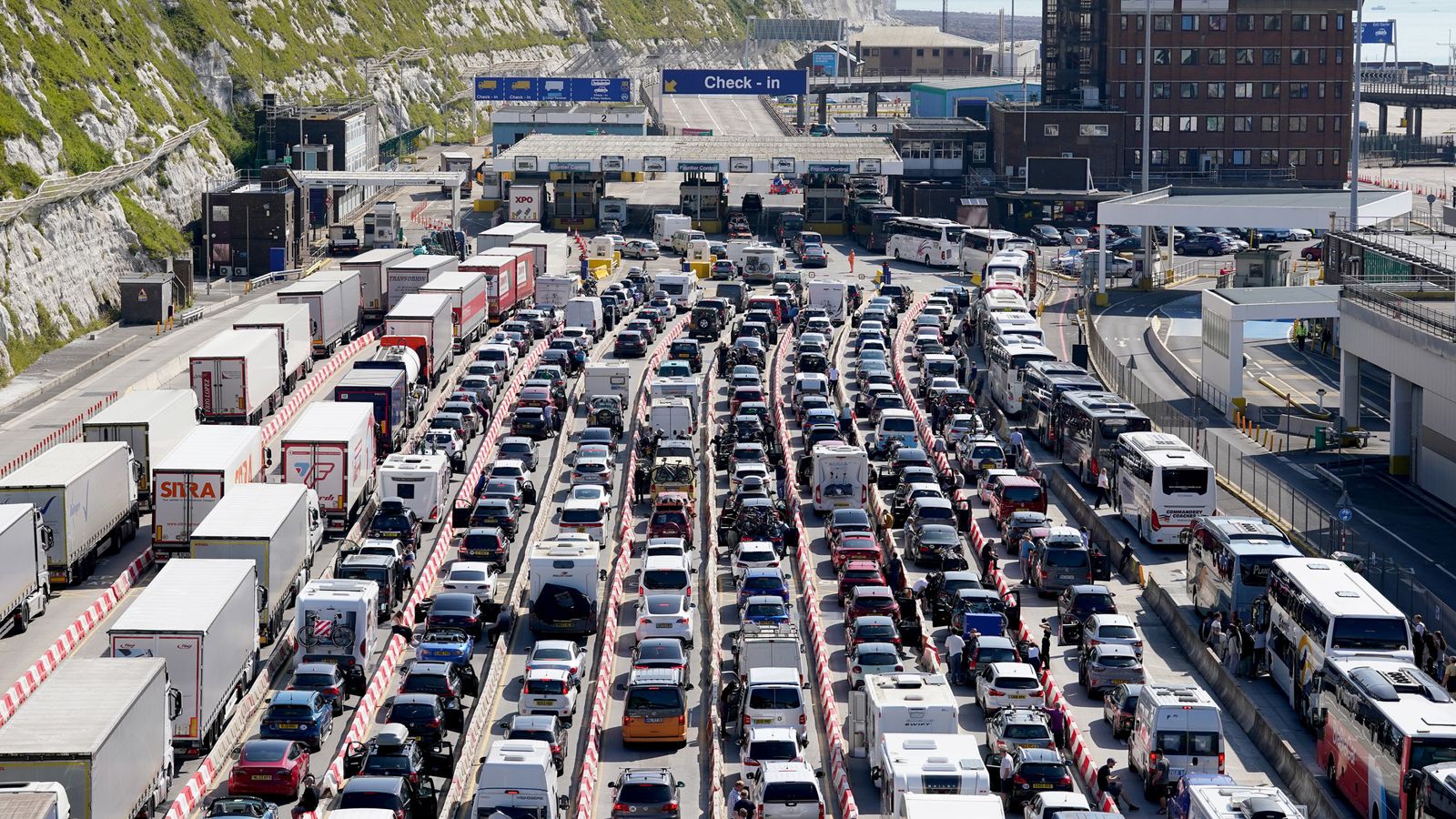New post-Brexit border controls on animal and plant products imported from the EU will cost businesses £330m a year in extra charges, the government has admitted.
Lucy Neville-Rolfe, a minister of state in the Cabinet Office, confirmed the figure in a letter seen by Sky News to Labour MP Stella Creasy, who chairs the Labour Movement for Europe.
On the costs of the new Border Trade Operating Model (BTOM), which will be phased in from January 2024, Baroness Neville-Rolfe wrote: “It will depend greatly on how businesses adapt their business models and supply chains to integrate the new controls regimes. We estimate these new costs of the model at £330m pa [per annum] overall, across all EU imports.”
Politics Live: Liz Truss channels Donald Trump as she addresses packed event
It comes ahead of a speech by Business and Trade Secretary Kemi Badenoch at the Conservative Party Conference on Monday, who will claim opponents of Brexit are “relentlessly wanting to talk down our country” and insist that while there are challenges posed by Brexit, “we are working to fix them”.
From January, European businesses exporting plant and animal products to the UK will have to submit extra paperwork known as health certificates, with physical checks costing up to £43 coming into force from April.
The checks – which have been delayed repeatedly since the Brexit deal came into effect in January 2021 – were due to start this month but were pushed back in August amid warnings the strategy risks further pushing up food prices.
The King sits above politics but his speech to French Senate was a list of political priorities
Brexit: ‘We don’t want to diverge’ from EU, says Sir Keir Starmer
Lib Dems gear up for ‘celebratory’ conference – but can they keep up the momentum?
The government has admitted the new system will add to inflation, but said this will be “minimal” at less than 0.2% over three years.
In her letter, Baroness Neville-Rolfe said the checks were required because since the UK left the EU “we have not had full biosecurity checks in place”, meaning it has become “more challenging to intervene to combat threats to animal, plant and human health”.
She pointed to the spread of pests and diseases across Europe – such as African Swine Fever – adding it would be “dangerous to underestimate the huge costs both to lives and livelihoods that an outbreak of these diseases could cause to the UK”.
The cabinet minister went on to to say that “around half” of the £330m figure is estimated to be on health certification, but this was a “saving” of £520m compared to a previous model that was going to be introduced in 2022.
However Ms Creasy suggested this was disingenuous as if the UK had not left the EU there would be no extra costs at all.
She said: ‘The government thinks it can get away with presenting red tape worth £330m as a good news story because it could have been higher- forgetting that its all extra costs that businesses can ill afford when they have already had a massive increase in red tape thanks to Brexit.
“British companies struggling with border paperwork to import food will have little choice over these charges meaning it’s likely British consumers will have to pick up the bill. Ministers need to urgently rethink for the sake of all those already suffering in the cost of living crisis.”
Industry bodies have repeatedly warned the government’s new model would likely push up prices as businesses would not be able to swallow the associated costs.
But on the other hand the National Farmers Union (NFU) said the lack of controls put them at a commercial disadvantage as British exports to the EU have been subject to health and safety checks for three years “while the EU has enjoyed continued easy access to the UK marketplace.”
Read More:
Brexit: ‘We don’t want to diverge’ from EU, says Starmer
Poll suggests 9% of Britons think leaving EU a success
The checks on EU imports are legally required under the terms of the Brexit trade deal with the EU.
The BTOM, which will be a global regime, aims to use more technology and digitisation to reduce bureaucracy than under the original import model devised post-Brexit.
William Bain, head of trade policy at the British Chambers of Commerce, said: “If the border plans result in fast and effective controls, allowing the UK to take advantage of new digital trade arrangements, then additional costs will be slightly easier to swallow.”
However he added: “Coming in the middle of a cost of living crisis, and with inflation still high, we would urge the government to consider ways to mitigate this huge expense”, suggesting the inspection charges would be “a good place to start”.
The checks are one of 20 new major policy changes between now and the end of 2024 that will impact British companies that trade internationally, according to the Institute of Export & International Trade.
Marco Forgione, the organisation’s director, said the digitalisation of UK trade has the potential to add £25bn to the country’s GDP but businesses need certainty and support.
“The government cannot defer or delay any longer. They set out a timetable. They’ve got to stick with it,” he told Sky News.






















